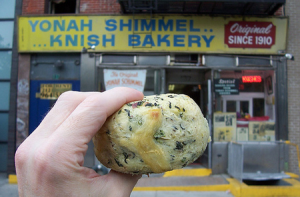“Okay, I’m really going to do it this time,” I whispered to Jason as he flipped through books on Brooklyn history with antiquated titles like Fire Laddies and Every Kind of Shipwork.
“Yep, you got this,” he told me. “Remember: spinach. Eye on the prize. Don’t get distracted by the lady with the pigtails.” He was right; the woman in question definitely had crazy in her eyes. I circled the table, trying out a stealthy, jaguar-like walk, and moved in for the kill.
 We had come not with the purpose of hunting, but of listening. Laura Silver, author of the new book Knish: In Search of the Jewish Soul Food, was giving a reading in the Brooklyn Collection of the library. The reading and the Q and A session did turn out to be fun; that woman seriously knows her knish. But I found it a little hard to concentrate, still flustered by the scene of primal competition that had gone down at the preceding wine and knish reception.
We had come not with the purpose of hunting, but of listening. Laura Silver, author of the new book Knish: In Search of the Jewish Soul Food, was giving a reading in the Brooklyn Collection of the library. The reading and the Q and A session did turn out to be fun; that woman seriously knows her knish. But I found it a little hard to concentrate, still flustered by the scene of primal competition that had gone down at the preceding wine and knish reception.
If we can back up for a moment, I will try to explain why I was excited about this reception in the first place. It’s possible, if you are reading this from somewhere that is not New York, that you have not tasted a knish. I don’t think I knew what one was until I first moved here, and, walking friendless and hungry around Central Park, I pointed to a deep-fried little square on a hot dog cart and asked if it was vegetarian. I think I got laughed at, but I was rewarded for my humiliation with a greasy, mustard-drowned potato pastry. A street knish: not fine dining, but exactly what I needed in that moment. And later, I found the sublime, handmade knishes at Yonah Schimmel, mounds of mashed potato filling so substantial that the thin pouches of pastry can barely contain them. Every cuisine has its dumpling comfort food—the pierogi, the gyoza, the tamale, the ravioli—and the knish is among my favorites. Naturally, when I heard about the reception, I looked forward to the opportunity to commune with fellow knish-lovers and break potato with them.
So I was a little upset when the other attendees turned into a pack of slavering, ravenous wolves, stealing the free knishes right out from under me. I sized up my competition warily: some old ladies with drawn-on eyebrows but surprisingly nimble fingers; a man in green button-up shirt who was not shy about using his elbows; and the undisputed ringleader of the group, a tall, grinning man who would point at the ceiling every time a new platter of mini-knishes arrived and say, “Look at the sky! Look at the sky!” in a not-so-subtle attempt to distract his rivals. They squeezed me out every time, leaving me with nothing but empty plate, and even though Jason managed to nip a few and had the good grace to share with me, I was depressed. Was there no humanity? No knish-sharing for the greater good? What if our damaged environment results in food shortages, and, unable to compete for resources, I am deemed worthless and cast aside? Such were the dark thoughts that plagued me as Green Shirt hip-checked me into the bookcase yet again.
“I think it’s in you,” Jason said. “I think you just have to get in touch with your more animal urges.”
Encouraged by this, I waited for the final batch of knishes to arrive at the table. I was poised, I was ready, and I was determined to have a spinach knish, the most coveted of all that were on offer. Green Shirt leaned, and I leaned back. Crazy Eyes hissed at me, and I snarled at her. The platter arrived, the knishes started to disappear, only one spinach left and then…there it was, in the palm of my hand! Triumph!
A lady who had arrived late, stared at the empty plate. “I didn’t get a single one,” she said. I’d like to say it was me who, saint-like, offered up my knish to her. But it wasn’t. It was the ringleader, who reluctantly handed a kasha one over to her, while I picked spinach out of my teeth. Watching him put his arm around her, I thought that maybe there was such a thing as knish fellowship after all.
“Next time,” he counseled her, “you gotta tell everyone to look at the sky.”

